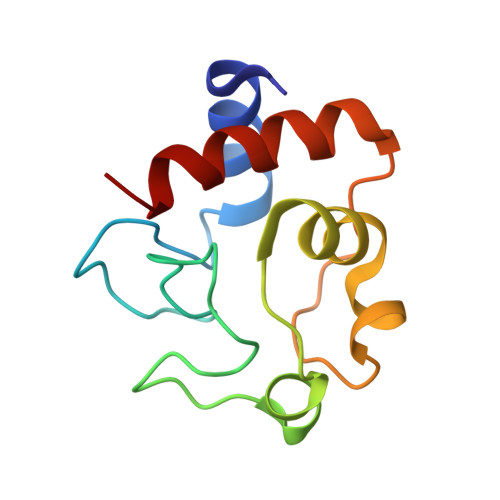Lysine 53 Acetylation of Cytochrome c in Prostate Cancer: Warburg Metabolism and Evasion of Apoptosis.
Bazylianska, V., Kalpage, H.A., Wan, J., Vaishnav, A., Mahapatra, G., Turner, A.A., Chowdhury, D.D., Kim, K., Morse, P.T., Lee, I., Brunzelle, J.S., Polin, L., Subedi, P., Heath, E.I., Podgorski, I., Marcus, K., Edwards, B.F.P., Huttemann, M.(2021) Cells 10
- PubMed: 33916826
- DOI: https://doi.org/10.3390/cells10040802
- Primary Citation of Related Structures:
7LJX - PubMed Abstract:
Prostate cancer is the second leading cause of cancer-related death in men. Two classic cancer hallmarks are a metabolic switch from oxidative phosphorylation (OxPhos) to glycolysis, known as the Warburg effect, and resistance to cell death. Cytochrome c (Cyt c ) is at the intersection of both pathways, as it is essential for electron transport in mitochondrial respiration and a trigger of intrinsic apoptosis when released from the mitochondria. However, its functional role in cancer has never been studied. Our data show that Cyt c is acetylated on lysine 53 in both androgen hormone-resistant and -sensitive human prostate cancer xenografts. To characterize the functional effects of K53 modification in vitro, K53 was mutated to acetylmimetic glutamine (K53Q), and to arginine (K53R) and isoleucine (K53I) as controls. Cytochrome c oxidase (COX) activity analyzed with purified Cyt c variants showed reduced oxygen consumption with acetylmimetic Cyt c compared to the non-acetylated Cyt c (WT), supporting the Warburg effect. In contrast to WT, K53Q Cyt c had significantly lower caspase-3 activity, suggesting that modification of Cyt c K53 helps cancer cells evade apoptosis. Cardiolipin peroxidase activity, which is another proapoptotic function of the protein, was lower in acetylmimetic Cyt c . Acetylmimetic Cyt c also had a higher capacity to scavenge reactive oxygen species (ROS), another pro-survival feature. We discuss our experimental results in light of structural features of K53Q Cyt c , which we crystallized at a resolution of 1.31 Å, together with molecular dynamics simulations. In conclusion, we propose that K53 acetylation of Cyt c affects two hallmarks of cancer by regulating respiration and apoptosis in prostate cancer xenografts.
Organizational Affiliation:
Center for Molecular Medicine and Genetics, School of Medicine, Wayne State University, Detroit, MI 48201, USA.
















